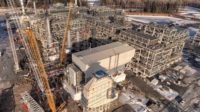Construction and infrastructure-related measures fared well at the polls on November 7, in an off-year election that also saw infrastructure-supporting Democrats elected governor in Virginia and New Jersey.
According to Reuters, voters across about 26 states approved $21.08 billion worth of bonds, while those in 22 states rejected about $3.59 billion in debt issuance.
The American Road & Transportation Builders Association said that voters in 20 states approved more than 80% of 215 transportation finance ballot measures, mostly at the local level, totaling $2.9 billion in new investment revenue and $1.3 billion in continued funding through tax extensions or renewals.
A proposal to build a new airport terminal in Kansas City as a public-private partnership headed to victory by a comfortable margin, culminating the $1 billion project’s six-month evolution from an unsolicited no-bid proposal to a hotly competitive bidding battle among the nation’s leading construction players.
A proposal to build a new airport terminal in Kansas City as a public-private partnership headed to victory by a comfortable margin, culminating the $1 billion project’s six-month evolution from an unsolicited no-bid proposal to a hotly competitive bidding battle among the nation’s leading construction players. The contract was awarded in September to a consortium led by Clark Construction. Designs for the new terminal are still being finalized, and no date has been set for construction to begin.
Denver voters likewise strongly supported their first general obligation bond measure since 2007.
The eight-part bond package totals $937 million, nearly half of which will go toward transportation projects around the city. Other programs slated for funding include $151.6 million for parks and recreation centers, $116 million for cultural facilities and $77 million for safety projects.
Two-thirds of Dallas residents supported a 10-part, $1.05 billion bond package that covers street and transportation improvements, new parks, libraries and other public facilities.
Texas voters made a strong push for public education facility investment, with those in metro Houston approving $2.7 billion for schools tin eight bond packages that all gained at least 57% approval, those in Austin okaying about $1.1 billion and in Fort Worth, about $750 million.
In Charlotte, N.C., and surrounding Mecklenburg County, nearly 75% of voters in endorsed a $922-million school bond issue that will support 28 new construction and renovation projects over the next five years that will result in 1,250 new or renovated classrooms for more than 20,000 children.
Cleveland-area voters approved a $227-million bond issue to fund repairs and expansions to more than 50 buildings at eleven locations operated by Cuyahoga Community College but a $48.5 million community college finance measure did not win support in Houston.
At the state level, Maine voters approved issuing $105 million in bonds for transportation infrastructure projects, most of which will be directed for construction and repair of highways and bridges across the state. It was the second consecutive victory for transportation funding in Maine, as voters approved a $100-million measure last year.
New Jersey voters approved a measure to allow the state to borrow $125 million to upgrade and expand public libraries, the first in 18 years.
The Election Issues
Climate change figured prominently in a successful campaign to win Miami voters’ approval of a $400-million bond program that will be used in part for a variety of stormwater infrastructure upgrades, including storm drains, flood pumps and sea walls. Other bond funded projects include affordable housing, parks and cultural facilities and road improvements.
In a vote so close that it was not decided until Nov. 8, Denver voters opted to support the city's green roof measure by a 54% margin. It requires new commercial buildings of 25,000 sq ft or more to install gardens and solar panels on rooftops, and that green roofs be added to similarly sized older buildings when they are re-roofed.
Although some older structures could be exempt, the measure is considered among the strictest in the U.S. Real estate interests and developers backed by large contributors opposed the initiative, as did Denver Mayor Michael Hancock. City officials say they are closely studying the initiative to determine how best to implement it.
New Jerseyans endorsed a constitutional amendment that will require lawmakers to earmark funds the state gains in polluter damage settlements only for environmental cleanup and restoration projects, barring diversion to other state uses, as has occurred in the past.
Now set to direct that spending and other state infrastructure investment is newly-elected Democrat Phil Murphy, who easily defeated Republican Lt. Gov. Kim Guadagno, in a race seen as a referendum against unpopular Republican Gov. Chris Christie, who served two terms and could not run again.
Murphy has promised to build the Gateway Tunnel megaproject between Newark and New York City and to push state support for clean energy, particularly offshore wind power, which Christie opposed and blocked. Guadagno also had supported offshore wind in her campaign.
Murphy has pledged ta goal to have 100% of the state powered by renewable energy by 2050, which would include building 3,500 MW of offshore wind by 2030—triple the Christie-era goal set by the legislature that he never supported. Even so, two developers —U.S. Wind and Ørsted (formerly DONG Energy) have indicated plans to develop their leased offshore ocean tracts.
Worries About Tax Reform Ideas
But proponents worry that the Trump administration tax-reform plan now being debated would cut by one-third a tax credit for wind production eventually phase out the current tax credit for solar after 2027, and eliminate an electric vehicle tax incentive.
“New Jersey needs a new vision for transportation and the Governor-elect is poised to deliver that,” says Joe Fiordaliso, president of the American Council of Engineering Cos.-New Jersey, who adds that Murphy’s “top priority will be fixing NJ Transit.” The giant statewide transit system faces major capital and operating cash shortfalls.
In Virginia, Lt. Gov. Ralph Northam won a contentious and closely watched governor’s race, outpolling his GOP opponent Ed Gillespie by 8% in the lone southern state won by Hillary Clinton in the 2016 presidential election.
Democrats also appeared poised to erase most, if not all, of the Republicans’ 16-seat majority in the state House of Delegates. Control now hinges on the outcomes of 4 to 5 races. The GOP retains a one-seat edge in the state Senate, which comes up for election in 2019.
Media reports say neither candidate aired significant detail on transportation issues, but Northam's infrastructure investment pledges include improvements at Norfolk's port, adding tolled express lanes to Interstates 95 and 395, and support for two natural gas pipelines through southern Virginia if they win regulatory approval.
According to The Washington Post, he opposes offshore drilling and favors a dedicated source of funding for the beleaguered Metro transit system in the state's Washington, D.C. area suburbs, although he supports an "overhaul" of the agency before more funds are provided.
New Funding Initiatives
“It’s too early to tell what new funding initiatives he may pursue, but Gov. Northam has demonstrated an understanding of the importance of transportation and infrastructure to Virginia’s economic development,” says Jeffrey C. Southard, executive vice president of the Virginia Transportation Construction Alliance, an advocacy group of 300 industry firms that endorsed him. “Clearly there are issues that need to be addressed.”
Democrats also took a slim majority in the Washington state senate, joining that party's control of the state House and and governor's office, with plans to push through a $4-billion capital construction budget that stalled before the election over rural water rights politics. Media reports say Gov. Jay Inslee could convene lawmaker back in session next month on the capital plan, which also needs Republican support to pass, but that the Democratic legislative majority could catapult his push for new climate change legislation in the coming year.
But it looks like voters in the Portland, Ore., region won't see on next year's Election Day ballot a $1.7-billion measure to help fund the Southwest Corridor light-rail project. Regional officials could not reach agreement on other transportation projects to include in the measure in time to meet the 2018 ballot deadline, said The Oregonian on Nov. 13. They are hopeful to have the measure on voters' 2020 ballots.








Post a comment to this article
Report Abusive Comment